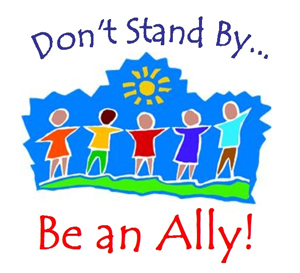What is an Ally?
An ally is someone who acts to support those who are bullied. Empowering children to be advocates will help the culture of your program and it will build awareness. By equipping young people with the skills and abilities to be honest and open about their lives, you will support all of your students and equip them with the skills to address bullying.
Here are a few tips your staff can take advantage of in order to teach students how to be an ally. It is critical to advise children to always think about their safety first when choosing the best way to respond to bullying situations.
1. Don’t participate
Not participating in bullying is the most effective way to be an ally. By not engaging, you do not help escalate the interaction. Things—like a laugh, stare, or cheer for the bad behavior can send a message that the bully is getting attention- which is exactly what the bully wants. By disengaging, it sends a message that is not funny, and you are not okay with treating people this way.
2. Tell offenders to stop.
As I mentioned, it is best to think about your safety first when deciding the safest way to respond. If you feel comfortable or safe to speak to the aggressor about their disrespectful behavior, you should do so. You can tell them you don’t approve on the spot or later in private. Letting the offender know how hurtful it is to be bullied may cause them to think twice before picking on someone again.
3. Inform a trusted adult.
Often you may need extra support to stop bullying. It’s essential to tell an adult who you trust. This adult can be an ally to you because unfortunately trusting the wrong person can lead to them being a target. Teach kids that they are not “tattling” or “snitching” when reporting an incident of bullying to an adult. Do not hesitate to reach out to a parent, after-school teacher, coach, or someone else who will get involved.
Make sure that camp staff understands what bullying behavior is and that when bullying or bias occurs, they should interrupt it on the spot, find out what happened, and support the young people involved. The most crucial step staff members can take to prevent bias and bullying at camp is to establish a safe respectful environment.
As stated earlier, bullying happens online too. Looking at mean web pages and forwarding hurtful messages is just like laughing at someone or spreading rumors in person. It is just as harmful even if you can’t see the other person’s face. All the rules above are just as important to follow when texting and on social media. So online and offline—do your part to be an ally to others.

Tiana Brown is the Assistant Director of the Norwalk Housing Authority Learning Centers

